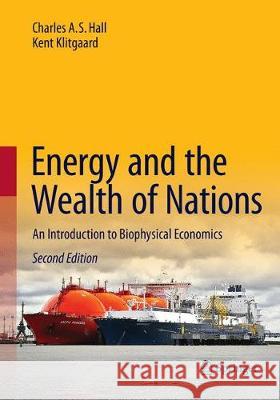Energy and the Wealth of Nations: An Introduction to Biophysical Economics » książka



Energy and the Wealth of Nations: An Introduction to Biophysical Economics
ISBN-13: 9783030097646 / Angielski / Miękka / 2018 / 511 str.
Energy and the Wealth of Nations: An Introduction to Biophysical Economics
ISBN-13: 9783030097646 / Angielski / Miękka / 2018 / 511 str.
(netto: 325,85 VAT: 5%)
Najniższa cena z 30 dni: 250,57
ok. 22 dni roboczych
Dostawa w 2026 r.
Darmowa dostawa!
"This second edition of Energy and the Wealth of Nation succeeds in covering both an enormously heterogenous selection of material while remaining utterly accessible. ... this textbook would be very useful for first- and second-year undergraduates, and also an excellent reference for upper years and indeed any person wishing to get an accessible introduction to the main concepts and analysis of biophysical economics." (Martin Sers, Journal of Environmental Studies and Sciences, Vol. 10, 2020)
"This textbook has constructed an excellent approach on how to better understand economies and natural systems, and their interactions. ... this book functions as a valuable academic discussion, as well as a starting point for the economic uninitiated. It has the potential to be an effective textbook for institutions looking to advance their economic teaching past the mainstream model and to seriously incorporate sustainable thinking into their teaching of economics." (Aaron Grinter, Economic Record, Vol. 95 (308), March, 2019)
Part I Energy and the Origins of Wealth.- Poverty, Wealth, and Human Ambition.- Energy and Wealth Production: An historical perspective.- The Petroleum Revolution I: The first half of the age of oil.- Part II Energy, Economics and the Structure of Society.- Explaining Economics from an Energy Perspective.- The Limits of Conventional Economics.- The Petroleum Revolution II: Concentrated Power and Concentrated Industries.- The Postwar Economic Order, Growth and the Hydrocarbon Economy.- Globalization and Efficiency.- Are there Limits to Growth? Examining the Evidence.- Part III Energy and Economics—the Basics.- What is Energy and How is it Related to Wealth Production?.- The Basic Science Needed to Understand the Relation of Energy to Economics.- The Required Quantitative Skills.- Economics as Science: Social or Biophysical?.- Part IV The Science Behind How Economies Work.- Energy Return on Investment.- Peak Oil, EROI, Investments and Our Financial Future.- Access to Energy and Social Inequality.- The Role of Economic Models for Good and Evil.- How to do Biophysical Economics.- Part V Understanding How Real World Economies Work.- Peak Oil, the Great Recession and the Quest for Sustainability.- Energy, Climate Science, and Planetary Boundaries.- Living the Good Life in a Lower EROI World.
Charles A.S. Hall is a Systems Ecologist who received his PhD under Howard T. Odum at the University of North Carolina at Chapel Hill. Dr. Hall is the author or editor of seven books and more than 250 scholarly articles. He is best known for his development of the concept of EROI, or energy return on investment, which is an examination of how organisms, including humans, invest energy into obtaining additional energy to improve biotic or social fitness. He has applied these approaches to fish migrations, carbon balance, tropical land use change and the extraction of petroleum and other fuels in both natural and human-dominated ecosystems. Presently he is developing a new field, biophysical economics, as a supplement or alternative to conventional neoclassical economics, while applying systems and EROI thinking to a broad series of resource and economic issues.
Kent A. Klitgaard is Professor of Economics and the Patti McGill Peterson Professor of Social Sciences at Wells College in Aurora, New York, where he has taught since 1991. Kent received his Bachelor’s degree at San Diego State University and his Master’s and PhD at the University of New Hampshire. At Wells, he teaches a diverse array of courses including the History of Economic Thought, Political Economy, Ecological Economics, The Economics of Energy, Technology and the Labor Process, and Microeconomic Theory, and is a co-founder of the Environmental Studies Program. Kent is active in the International Society for Ecological Economics, and is a founding member of the International Society for Biophysical Economics. Recently, his interests have turned towards the degrowth movement, and he has published multiple papers on the subject for Research and Degrowth.
In this updated edition of a groundbreaking text, concepts such as energy return on investment (EROI) provide powerful insights into the real balance sheets that drive our “petroleum economy.” Hall and Klitgaard explore the relation between energy and the wealth explosion of the 20th century, and the interaction of internal limits to growth found in the investment process and rising inequality with the biophysical limits posed by finite energy resources. The authors focus attention on the failure of markets to recognize or efficiently allocate diminishing resources, the economic consequences of peak oil, the high cost and relatively low EROI of finding and exploiting new oil fields, including the much ballyhooed shale plays and oil sands, and whether alternative energy technologies such as wind and solar power can meet the minimum EROI requirements needed to run society as we know it.
For the past 150 years, economics has been treated as a social science in which
- Includes several new chapters and comprehensive updates addressing the implications of hydraulic fracturing (fracking), access to energy and social inequality, as well as climate science and planetary boundaries
- Integrates energy and economics by combining natural and social sciences
- Uses predictive tools and measures, such as EROI, to show how the economy is embedded in a biophysical world subject to scientific rules and constraints
- Provides a fresh approach to economics for those wondering “What’s next?“ after the Great Recession and continued volatility in energy prices
- Offers economic analysis from the real-world perspective of peak oil, high energy prices, the role of alternative energy sources, and potential environmental impacts of energy use such as climate change
1997-2025 DolnySlask.com Agencja Internetowa
KrainaKsiazek.PL - Księgarnia Internetowa









